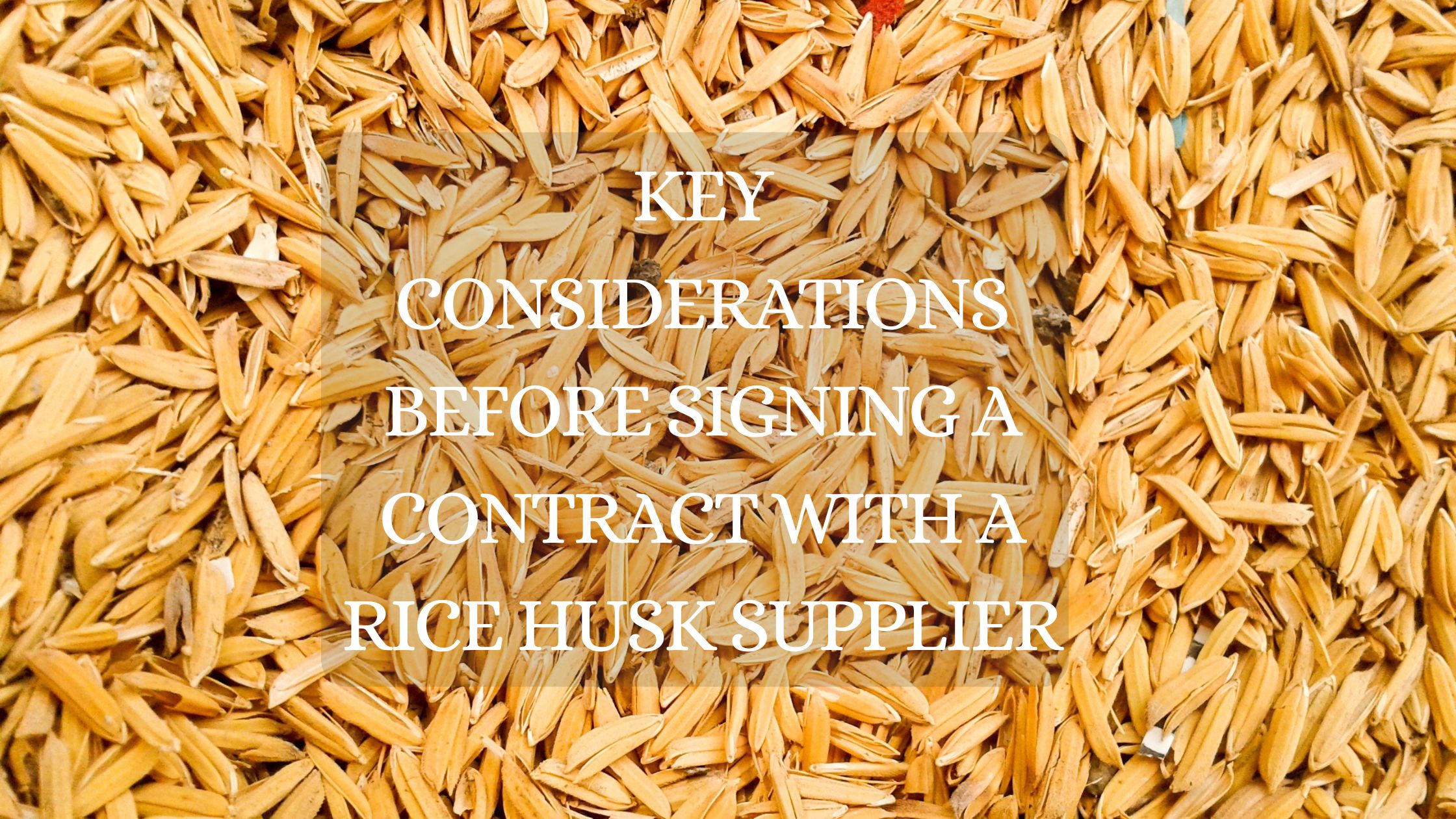Introduction
When it comes to sourcing raw materials for your business, choosing the right rice husk supplier is a critical decision. Whether you’re using rice husk for biomass fuel, cattle feed, construction materials, or any other purpose, your supplier plays a big role in maintaining quality and consistency. A poor choice can lead to supply delays, low-quality material, or even financial losses.
Before you sign on the dotted line, it’s important to consider several key factors that can make or break your business relationship with a rice husk supplier. In this blog, we’ll guide you through the essential points you should evaluate before entering into a contract.
Understand Your Business Needs First
Before you even start looking for a supplier, you should be clear about your own needs. What quantity of rice husk do you need per week or per month? What quality or grade are you looking for? Do you need it in powder form or pellet form? Are there any special packaging or delivery requirements?
Having a clear idea about your specific requirements helps you communicate better with potential suppliers. It also makes it easier to compare different suppliers and choose the one that best fits your needs.
Check the Supplier’s Track Record
One of the most important steps before signing a contract is doing a background check on the supplier. Try to find out how long they have been in business and whether they have worked with companies similar to yours. A supplier with a proven track record is more likely to be reliable and professional.
You can also check online reviews, ask for references, or even speak to existing clients. This gives you an honest view of the supplier’s performance, delivery reliability, and product quality.
Evaluate the Quality of the Rice Husk
Not all rice husk is created equal. The quality of rice husk can vary depending on where it’s sourced, how it’s processed, and how it’s stored. Poor-quality rice husk can cause problems in your manufacturing or processing activities. It can damage equipment or result in substandard end products.
Ask for samples before signing any contract. Test the sample in your setup to ensure it meets your quality standards. Make sure the quality mentioned in the contract matches what you are testing now.
Check for Consistency in Supply
It’s not enough for the supplier to provide quality rice husk once. You need consistency in every shipment. A one-time good delivery does not mean they will always maintain the same quality and timing.
Discuss their storage capacity, production capability, and delivery system. Find out whether they can handle urgent or large orders if needed. Consistency ensures your business runs smoothly without interruptions.
Review Pricing and Payment Terms
Cost is always an important factor, but cheaper is not always better. A very low price might mean the supplier is cutting corners on quality or has hidden costs that show up later.
Make sure you understand the full pricing structure. Are there extra costs for packaging, delivery, or taxes? What are the payment terms? Is an advance required? Are there any penalties for late payments or cancellations?
Get all financial terms written into the contract to avoid misunderstandings later.
Understand Delivery Schedules and Logistics
Timely delivery is crucial for any business. Late deliveries can delay your production and cause a loss of income. Before signing the contract, understand the supplier’s delivery capacity and logistics network.
How long does it take to deliver once the order is placed? Do they deliver directly to your location, or do you need to arrange pickup? What happens if there’s a delay due to weather, transport issues, or holidays?
Having clear answers to these questions helps ensure smooth coordination once the contract is live.
Discuss Packaging and Handling
Rice husk is lightweight and can be difficult to handle in bulk. Improper packaging can lead to wastage, spillage, or contamination. Make sure the supplier uses proper bags, containers, or packaging material that suits your operational needs.
Ask about how the rice husk is stored and handled before it reaches you. Clean, dry, and safe packaging helps maintain the quality and usability of the material.
Look for Flexibility in the Contract
A rigid contract may seem fine when everything is going smoothly, but problems can arise if your business needs change. Maybe you want to increase your order volume, change the delivery schedule, or pause supplies for a few weeks.
A good contract should have some room for flexibility. Look for clauses that allow for minor changes without penalties. Discuss what happens if you want to terminate the contract early or renew it for a longer term.
Ensure Legal and Regulatory Compliance
Make sure the supplier operates legally and meets all the necessary government regulations. This includes having the right licenses, permits, and certifications for producing and supplying rice husk.
This not only ensures you’re working with a legitimate business but also protects you from legal trouble in the future. If you’re dealing with exports or imports, check for any compliance requirements related to customs, taxes, or international trade.
Talk About Communication and Support
Strong communication is the key to a successful long-term partnership. Discuss how often you’ll be in touch with the supplier. Who will be your point of contact? Will you receive updates about shipment status?
Choose a supplier who is responsive, professional, and easy to reach. You should feel confident that if a problem arises, they will work with you to solve it quickly.
Finalize the Agreement in Writing
Once everything is discussed and agreed upon, get it all in writing. A verbal promise is not enough in business. The contract should include details about quality, quantity, pricing, payment terms, delivery schedules, penalties, and dispute resolution.
Read the contract carefully before signing. If needed, consult a legal expert to help you understand the fine print. This protects both you and the supplier and ensures a smoother business relationship.
Conclusion
Choosing the right rice husk supplier and signing a well-thought-out contract can make a big difference to your business. It can ensure consistent supply, save costs, and help you avoid unnecessary headaches down the line. By taking the time to evaluate the supplier’s experience, quality standards, pricing, delivery systems, and flexibility, you can make a smart and safe decision. Remember, the goal is not just to find a supplier, but to build a strong, long-term partnership that helps your business grow.


